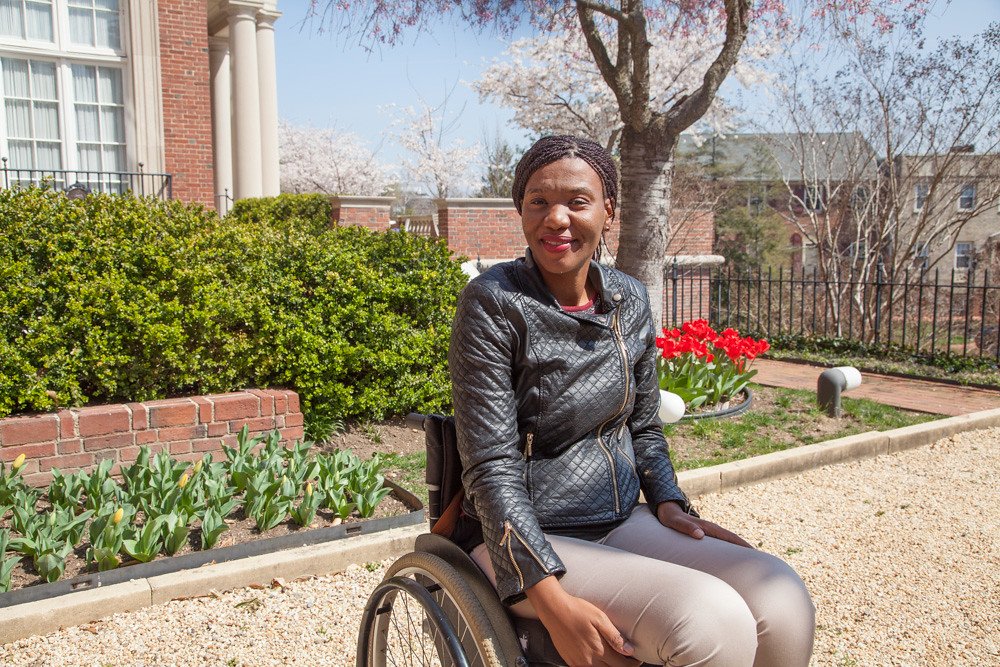Malebogo Molefhe is a trailblazing basketball player from Botswana. The only girl in a game played by boys, she was called the ‘tigress’ and rose to be captain of her country’s first ever women’s national basketball team.
But off the court she was controlled and abused by her partner, culminating in a brutal attack. Traumatised and with life-changing injuries, Malebogo fought to reclaim her life – and to find a way back to basketball.
This is her story of how she found her love for basketball once and again.
On a summer’s day in 1995, 15-year-old physically fit Malebogo Molefhe sat at a corner of the court. She watched the neighborhood boys bounce their basketball up and down the court. A sportswoman at heart, this was her first time seeing the game played. It piqued her interest and she wanted in. Well timed, it’s like they knew she wanted to play, so cue the action. They shouted, ‘we’re picking teams!’ and the other children screamed, begging to be picked. The boys in charge picked Malebogo Molefhe, much to her surprise.
“I thought they would not want to pick a girl’ but because of the level of how I played they really really wanted me to play with them and said, ‘we’re taking Max’.”
Max was her nickname for when she brought her A-game to the courts.
“It was very exciting. Me, as the only girl playing with guys it was amazing.”
Malebogo on the court troubled the guys. Tall in stature, she towered over the boys and that especially came in handy for defence.
“One of my favourite things in defence was blocking guys out from taking a shot. They named me the Tigress because of that.”
“I was growling at the guys. I never gave them a chance to make me feel any less capable of the sport. At the time I really was the only girl who knew how to play the sport and then I started recruiting other girls in my school. I put so much into basketball that I became the top player in the school and our school always took the first position in basketball. So this was one of the most fantastic times of my life. When I was into sport and I was young I was very active.”
During this time she met someone.
“This guy that I met, also was playing basketball. So we met at a basketball tournament and both of us were very tall though he was taller and I definitely played better than him.
What attracted me to him was that we were both athletes, we were both tall and it turned out that we both were from the same village unbeknownst to me.
I was a young girl and I had not had a boyfriend before and this was someone who was pursuing me; to cut it short, it was love at first sight.”
In 1997 with all the amazing success at school and in the neighbourhood she had the opportunity to try out for the National Women’s Basketball team.

“That was the big leagues. Botswana hadn’t had the chance to form a team for women; this was the very first team. So it was also exciting that I was to be representing my own country.”
They played across Southern Africa on the court against Lesotho, South Africa and Swaziland. Malebogo Molefhe flourished being a captain in 2002 but it wasn’t glitz and glamour for the underfunded Botswana team.
There were many challenges due to the fact that in Botswana sports was not a priority for the low-income country. To raise funds sometimes they had to run a car wash or sell hotdogs by the roadside.
“During that time I was just the ‘it’ girl of basketball. The biggest cup that we got was in Swaziland for the Kukser Games. A games competitions for teams around Southern Africa and because we had limited funds we went all by ourselves without a coach. So we had to coach ourselves and we had to put money together so that we could have meals. So when we got the trophy it was a defining moment. It was so beautiful.”
Malebogo’s professional career lasted until 2005 when she stopped so that she could focus on university and her job at a telecommunications company. But basketball was certainly not out of her life. She played socially with her former teammates. By then, her boyfriend also joined the army.
“Somewhere down the road there were a lot of disagreements between us. He had elements of control; he would try and pick friends for me and would want to dictate certain things to me. So we started fighting and the relationship started to suffer.
Sometimes he’ll want to dictate to me who I need to hang out with or how he wanted me to dress saying he wanted his woman to look – for example he wanted me to wear a dress and not pants. He’d say things like, ‘I don’t want a woman who is like this, I want a woman who is like that’.”
“I was very naive, trusting and very submissive. Then he started to physically abuse me. He would forcefully want to put his point across because I wasn’t understanding him well. It will end with a slap or a kick. It happened quite often.”
The abuse went from slaps and telling her how to dress to fierce incidents; one in 2006 when she was kicked.
“I was at work and I received a message from him saying, ‘last night was good…’. I was shocked because I know I was not with him on that day. I only realised the message was not intended for me, rather he was trying to send it to someone else. I sent the message back to him. He panicked and then he came to my house later in the night.
He was fighting for the phone, he wanted to remove the message from the phone so he smashed the phone first and then he started to slap me and kick me. My ribs were hurting. I had bruises on my ribs and a swollen face. It was not easy for me to go to work the next day. So I went to the hospital.”
Though he cheated on her and beat her, she couldn’t tell her parents and family.
“I was very stupid but in a very abusive situation. Sometimes you bottle your feelings and sometimes you are embarrassed to tell your friends or family that you are in that type of situation. Especially when you really love that person, you want it to work. So I hid it mostly because I wanted to. Most times he apologised after, I thought. So I’d feel like he’s sorry and he’s not going to do that again and he also said don’t tell anyone.”
Now 10 years into the relationship, the abuse heightened and became more prevalent. Her boyfriend finally admitted he was seeing someone else and Malebogo ended the relationship for her own good in 2009.
“I just started to think for myself by that time.”
Not that long later, he called.
“We were not together at this point. But he called in the afternoon and wanted to check on me, to just mend things up. I said gently to him, ‘I don’t think this will work anymore because you’ve done this before and it has never worked.’
I told him we forgive each other and then I told him no, I can’t. He kept persisting and asking to come over. He sounded very desperate on the line but then he just hung up.
I thought that was the end of the matter and so I went to bed.”
“Then I was woken up by a loud bang of breaking windows. I screamed at the top of my lungs thinking that I may have been attacked by thieves. But when I screamed I heard a familiar voice call me from outside saying, ‘Please baby don’t scream it is me’. I was just shocked to realise it was him because I thought he was on duty.
‘What are you doing here?’ Malebogo asked.
‘I just want to talk. Please open up for me,’ he responded.
“He was outside and I was inside while we were talking through the broken window. I wanted it that way because I knew he was someone with a very short fuse. He could explode and I was afraid of what he could do to me.”
‘Can I call your brother? To come so we can talk with him?’ she asked her ex.
With no response, she tried to call his brother’s number quickly then he said, ‘open up I have the gun. If you don’t open up I am going to shoot you.’
“I was terrified and I was trembling because I had never seen the sight of a gun before. He came around the house and shot at the door a couple of times until he was able to forcefully break it and gain entry and that is when he found me just there sitting in shock.
That’s when everything started happening so fast.”
“He pulled me from the ground and instructed me to get dressed and I quickly put on my sweater and I was just barefooted. I don’t know where he was taking me to. As we were outside the yard by the gate, I realised the police were there and so were soldiers.”
It turns out the neighbours had called the police.
“There was that flicker of hope but what happened was he pulled me and put the gun right on the side of my head and then he pulled the trigger. It clicked and the gun jammed. He had to release me to get the gun prepared again and this is when I tried to flee.”
“I hadn’t gotten any farther away from him when I felt a hot substance pierce through my body and I fell face down to the ground. He came over me and shot a couple of times more; until he was satisfied that the deed was done. I was just lying there in a pool of blood.”
Then there was another loud bang. “He had shot himself, committed suicide and fell right beside me.”
That was it.
Malebogo Molefhe’s ex-boyfriend had shot her eight times.
“I was in and out of consciousness so I was not aware of how horribly I was injured. I was shot in my hands, in my ribs, on the neck, and in other parts of my body.”
The only plus side to all this is that the authorities were there.
“They took me to the hospital. I woke up the next day surrounded by my family and I think that this was one of the toughest times of my life. Looking at my mum, looking at everyone… The doctors immediately told my parents that because of the injuries I will contract pneumonia, I will develop pressure sores and eventually die,” Malebogo Molefhe recalled.
“But my mum never accepted that because I was the only child,” Malebogo said. “My family did not take this kindly. They refused to allow this to happen to me. So they argued with the doctors and transferred me to South Africa to receive intensive care.”
Miraculously none of the bullets had damaged her internal organs. So in South Africa, Malebogo Molefhe pulled through. But the aftermath was devastating.
“When I got out of intensive care my mum told me with the doctor that I may not be able to walk again. For me to be told that I may not walk again, that I will be confined to a wheelchair was just a devastating moment. You just think this is a bluff. The reality of it all was a very hard thing to process. I used to be walking, I was a star. Now, I’m nothing.”

The other thing haunting Malebogo was why her ex-boyfriend would do this to her.
“You know that was the most damaging thing, that when I was lying there in the hospital I’d ask myself why? Why? Would he do that and destroy me in a diabolical way? These are the things that would constantly make me hurt.”
Surviving the attack was one of the most difficult periods for Malebogo Molefhe.
“I continually had psychological therapists working with me because it was not just physical. It was the trauma part also. How was I going to forget all of this? The other thing was the element of humiliation. How will I face my peers? How would I explain it to them, I thought as well. Because there’s the disability and then the burden of explaining it to them.
As a disabled person it is very frustrating when people ask can you stand and all that. As a disabled person people view you differently and as a woman they think you can’t have kids and can’t do other able-woman things. I ultimately lost my job and it also added to the frustration.”
What really kept her going was the love of my family, she says.
“The support that they showed me was so much that I would not be afraid to do anything. The whole time my mum kept assuring me that ‘despite all of this my daughter you are still my child’. So in the back of my mind I was like something has to give.”
“I decided I have to go back again, I have to fight.”
And by fighting she meant heading back to the basketball court and fighting for women like her.
Home from South Africa, laying in bed still recovering, Malebogo had time on her hands. So she tuned into the radio and listened to daily stories; most of which sounded very similar to what she had gone through. She realised that women and young girls had fallen victim to crimes of passion from all over the country and beyond.
In the telling of these stories, she noticed red flags that she could have noticed back then with her ex-boyfriend. Not too late, she decided to come out and share her story for the benefit of other women.
“The first time I shared my story, I was a wreck. Vividly I remember it. There was so much sadness. So much pain and everyone was crying and I was crying too but I pushed myself to finish my story. They asked me questions and some said to me, ‘Malebogo Molefhe this is a calling for you’.”
Eight years after the horrific attack that left her paralysed from the waist down Malebogo Mohlefhe, was ready to play her first tournament.
In therapy she had not made one basket during training and her wheelchair debut, she pushed through warm ups and finally made her first shot.
“The crowd was very excited because I was wheeling around screaming, ‘I made it’ and I was very very happy.” That is a moment that I will forever cherish.
Now in a wheelchair, Malebogo Molefhe campaigns against gender based violence and is forging new basketball dreams. Her story was heard by the International Women of Courage organisation and she was honoured. She also looks forward to competing for the national team at the upcoming Paralympic Games, Tokyo 2021.














